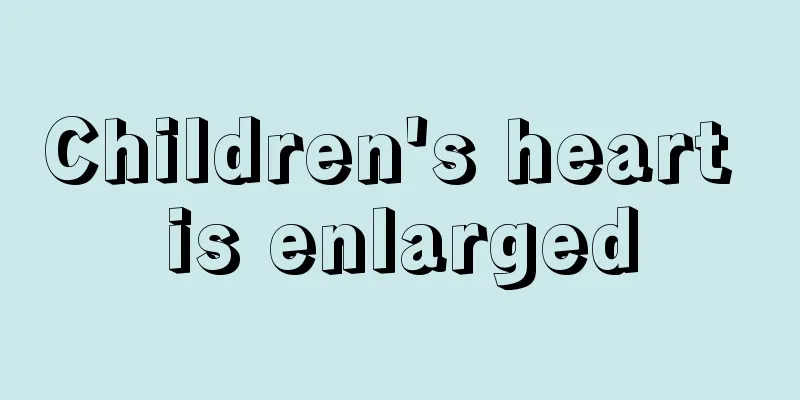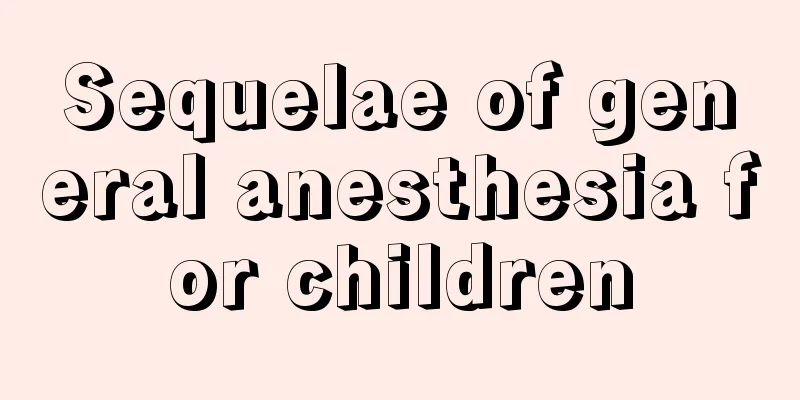Children's heart is enlarged

|
Every child is the apple of his or her parents’ eyes. We always encounter some strange diseases in our daily lives. When these diseases appear in children, parents will pay special attention to them. For example, if a child has an enlarged heart, many people will think that an enlarged heart is good, right? So is it really true that the bigger the child's heart is, the better? Below is an explanation of the dangers of an enlarged heart in children, as well as some solutions for children with an enlarged heart. What are the main causes of congenital heart disease? 1) Environmental factors of fetal development Infection: Babies born from viral or bacterial infections in the first three months of pregnancy, especially rubella virus, followed by coxsackie virus, have a higher incidence of congenital heart disease. Others: such as lesions of the amniotic membrane, pressure on the baby, threatened abortion in early pregnancy, maternal malnutrition, diabetes, phenylketonuria, hypercalcemia, the use of radiation and cytotoxic drugs in early pregnancy, and the mother's age may cause the baby to develop congenital heart disease. 2) Genetic factors Congenital heart disease has a certain degree of familial tendency and may be caused by abnormalities in the reproductive cells or chromosomes of the parents. Genetic studies suggest that most congenital heart diseases are caused by the interaction of multiple genes and environmental factors. 3) Others Some congenital heart diseases are more common in plateau areas, and some congenital heart diseases have significant gender differences in incidence, indicating that the altitude and gender of the birthplace are also related to the occurrence of this disease. Among patients with congenital heart disease, the cause of the disease can be found in very few, but strengthening the health care of pregnant mothers, especially actively preventing rubella, influenza and other rubella viral diseases in the early pregnancy and avoiding all factors related to the disease, has a positive significance for preventing congenital heart disease. What are the symptoms of congenital heart disease? 1) Heart failure: chest tightness, precordial pain, palpitations, especially after activities, these symptoms are more obvious. The baby looks pale, holds his breath, has difficulty breathing and tachycardia. The heart rate can reach 160-190 beats per minute and the blood pressure is often low. You can hear the rhythm of galloping horses. 2) Cyanosis: bluish purple color of the skin and mucous membranes at the tip of the nose, lips, nail beds, conjunctiva, etc. 3) Developmental delay and mental retardation: When cyanosis appears, the baby will have slow growth and development, mental retardation, and may have difficulty breathing when feeding or crying. In severe cases, the baby may lose consciousness and have convulsions. 4) Clubbing and polycythemia: chronic hypoxia, metabolic disorders, and toxic injuries at the extremities. The soft tissue at the ends of fingers or toes proliferates, thickens, and becomes clubbed, and the nails are excessively curved in both vertical and horizontal dimensions like a parrot's beak. This is caused by chronic hypoxia. 5) Squatting: When a child is held, his legs do not stretch out, but prefer to bend them on the adult's abdomen. When sitting, he prefers to lift his feet onto a stool, and when standing, his lower limbs remain bent. When older babies walk, they often feel a lack of oxygen to the brain, so they squat down with their knees close to their chest to rest for a while. This is medically known as the squat phenomenon. What are the dangers of congenital heart disease in babies? 1) Prone to pulmonary hypertension The disease progresses rapidly in infancy and childhood, and cases of left-to-right shunt such as ventricular septal defect are prone to pulmonary hypertension. When mild to moderate pulmonary hypertension occurs, surgical treatment can still be sought, but when it develops into severe pulmonary hypertension, the opportunity for surgery is lost and surgical treatment cannot be performed. 2) Lung infection This causes increased blood flow to the lungs, making it easy for lung infections to recur. 3) Infective endocarditis Abnormal cardiac structure can cause damage to local endocardial structure, making infective endocarditis more likely to occur. 4) Causes deformity or death of the baby If congenital heart disease is not treated, half of the children will die by the age of one, and two-thirds will die by the age of two. Moreover, the more complex the deformity, the more serious the condition, the more deaths and the earlier the death. This is one of the dangers of congenital heart disease. 5) Affects baby's growth and development There will be a disorder of blood supply to the body's tissues and organs, causing tissue hypoxia and affecting the baby's growth and development. 6) Congenital heart disease is a multi-gene genetic disease. It is currently recognized that congenital heart disease can be caused by environmental factors, genetic factors, or a combination of both, with the latter being particularly important. About 90% of congenital heart disease is caused by the interaction of genetics and the environment. What is the best time to treat congenital heart disease? For babies with congenital heart disease, the timing of surgery depends on several situations. 1) If the baby's growth and development is not greatly affected by the disease, surgery is usually performed on babies with patent ductus arteriosus when they are 2-6 years old; 2) For babies with atrial septal defect, surgery is generally most appropriate after 2-3 years old. 3) For babies with ventricular septal defect, if the symptoms are obvious, it is best to perform surgery between 1 and 3 years old. 4) If the baby is prone to repeated lung infections or other complications due to congenital heart disease that affect his growth and development, or even put his life in danger, the sooner the diagnosis is confirmed and the better the surgery. Now, with the continuous improvement of surgical methods and anesthesia techniques, newborn babies can also undergo heart surgery. How to prevent congenital heart disease? 1) Take good care of yourself during pregnancy Although the cause of congenital heart disease is not yet very clear, in order to prevent the occurrence of congenital heart disease, attention should be paid to the health care of pregnant mothers during pregnancy, especially in the early stages of pregnancy, such as actively preventing viral infections such as rubella, influenza, and mumps. Avoid exposure to radiation and some harmful substances. 2) Take medication under the guidance of a doctor Avoid taking medicines that may affect the baby's development, such as anti-cancer drugs, tolbutrin, etc. Actively treat the underlying disease, such as diabetes. Pay attention to a balanced diet and avoid nutritional deficiencies. Prevent local mechanical compression around the baby. In short, to prevent congenital heart disease, all factors related to the disease should be avoided. 3) Avoid strong magnetic fields In the early stages of pregnancy (before 3 months), try not to sit in places with strong magnetic fields such as microwave ovens for too long, because the baby is still unstable at this time and its organs are still in the formation stage, which may cause congenital heart disease in the baby. 4) Avoid contact with pets Avoid contact with pets, as the bacteria and microorganisms on pets may also cause congenital heart disease in your baby. 5) Premarital examination The incidence of congenital heart disease in children is approximately 4‰ to 8‰, which can be regarded as a common congenital disease. The best way to have a healthy baby is to go to the hospital for premarital examination and genetic counseling before marriage. Because congenital heart disease is a multi-gene genetic disease, pregnant mothers must undergo timely premarital examinations. What are the precautions for congenital heart disease? 1) Try to keep your baby quiet, avoid excessive crying, and ensure adequate sleep. Exercise moderately, strictly prohibit running, jumping and strenuous exercise, and ensure adequate sleep at night to reduce the burden on the heart. 2) Babies tend to sweat a lot, so their skin needs to be kept clean. They should be bathed frequently in the summer, wiped with a hot towel in the winter, and their clothes should be changed frequently. Feed plenty of water to ensure adequate moisture. 3) Maintain smooth bowel movements. When defecation is difficult, exerting excessive force will increase abdominal pressure, increase the burden on the heart, and even have serious consequences. 4) Keep the air circulating in the room and avoid staying in crowded public places to reduce the chance of respiratory infection. You should add or remove clothes as the weather changes, and pay close attention to preventing colds. 5) Go to the hospital's cardiology clinic for regular follow-up and take medication strictly according to the doctor's orders, especially cardiotonic and diuretic drugs. The dosage must be absolutely controlled and taken on time and according to the course of treatment to ensure efficacy. Before taking cardiotonic drugs each time, the pulse rate must be measured. If the heart rate is too slow, the drug should be stopped immediately to prevent drug toxicity and endangerment of the child's life. |
<<: At what age should children be weaned?
>>: Is low platelet count serious in children?
Recommend
How to improve children's lung capacity
Our breathing condition is closely related to our...
Symptoms of infantile spasms
In daily life, we may not understand certain dise...
Five physical methods of reducing fever in children without side effects
It is a common phenomenon for children to have a ...
What should I do if my child has a hunched back?
The physical growth and development of a child is...
What causes late teething in children?
After the baby is born, as the baby grows older, ...
Six-year-old boy grinds his teeth while sleeping at night
We all know that when a child reaches the age of ...
The baby has only one upper front tooth
Babies do not have teeth when they are just born,...
What should we do if children beat or scold their parents? Pay attention to communication!
For traditional families, it is common for parent...
What should I do if my child has a fever of 39 degrees and is having convulsions?
Generally speaking, when a child has a low fever,...
Newborns need to eat after spitting up milk
Mothers who often breastfeed their children know ...
What do children eat to grow taller
It is said that children are the flowers of the m...
What to eat when baby has stomach upset?
Babies with poor stomachs can eat scorched rice s...
What can students eat to help them with poor memory?
If students have poor memory, it will affect thei...
Why is the white of the baby's eye yellow?
The yellowing of the whites of the eyes of newbor...
What are the red spots on children's bodies?
Every child is the most precious treasure of a fa...









